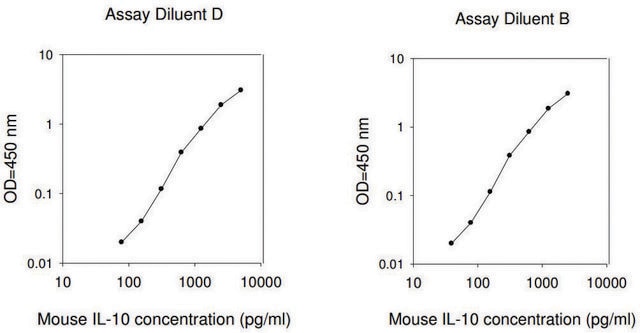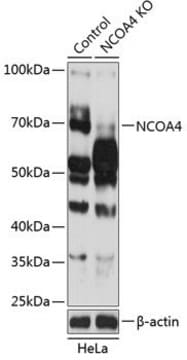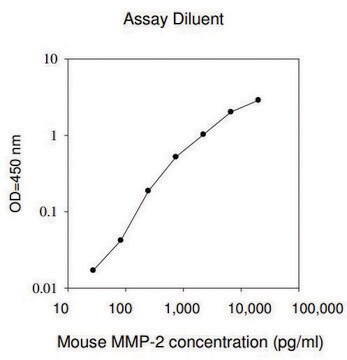RAB0120
Mouse CRG-2 / CXCL10 ELISA Kit
for serum, plasma and cell culture supernatant
Sign Into View Organizational & Contract Pricing
All Photos(2)
About This Item
UNSPSC Code:
41116158
NACRES:
NA.32
Recommended Products
Quality Level
species reactivity
mouse
packaging
kit of 96 wells (12 strips x 8 wells)
technique(s)
ELISA: suitable
capture ELISA: suitable
input
sample type serum
sample type plasma
sample type cell culture supernatant(s)
assay range
inter-assay cv: <12%
intra-assay cv: <10%
sensitivity: 15 pg/mL
standard curve range: 8.2-2000 pg/mL
detection method
colorimetric
shipped in
wet ice
storage temp.
−20°C
Gene Information
mouse ... Cxcl10(15945)
General description
C-X-C motif chemokine ligand 10 (CXCL10) is an inflammatory chemokine. It is essential for leukocyte trafficking. CXCL10 is also called interferon-γ-inducible protein 10, and is implicated in the cardiovascular disease pathophysiology.
The Mouse CRG-2 ELISA (Enzyme-Linked Immunosorbent Assay) kit is an in vitro enzyme-linked immunosorbent assay for the quantitative measurement of mouse CRG-2 in serum, plasma, cell culture supernatants and urine.
Immunogen
Recombinant Mouse CRG-2
Application
For research use only. Not for use in diagnostic procedures.
Please refer to the attached General ELISA KIT Procedure (sandwich, competitive & Indirect ELISA)
Please refer to the attached General ELISA KIT Procedure (sandwich, competitive & Indirect ELISA)
Other Notes
A sample Certificate of Analysis is available for this product.
Please type the word sample in the text box provided for lot number.
Please type the word sample in the text box provided for lot number.
Kit Components Also Available Separately
Product No.
Description
SDS
Signal Word
Warning
Hazard Statements
Precautionary Statements
Hazard Classifications
Met. Corr. 1
Storage Class Code
8A - Combustible corrosive hazardous materials
Choose from one of the most recent versions:
Already Own This Product?
Find documentation for the products that you have recently purchased in the Document Library.
Reza Vazirinejad et al.
Neuroimmunomodulation, 21(6), 322-330 (2014-03-20)
The etiology of several autoimmune diseases, including multiple sclerosis (MS), has still not been completely clarified. MS is defined as an autoimmune disease with clinical features of a chronic, inflammatory and demyelinating autoimmune disorder which affects the central nervous system.
Pleunie van den Borne et al.
BioMed research international, 2014, 893106-893106 (2014-05-29)
C-X-C motif ligand 10 (CXCL10), or interferon-inducible protein-10, is a small chemokine belonging to the CXC chemokine family. Its members are responsible for leukocyte trafficking and act on tissue cells, like endothelial and vascular smooth muscle cells. CXCL10 is secreted
Christina Hermanrud et al.
Journal of interferon & cytokine research : the official journal of the International Society for Interferon and Cytokine Research, 34(7), 498-504 (2014-01-22)
Interferon beta (IFNβ) is used as a first-line treatment in relapsing-remitting multiple sclerosis (MS). The occurrence of neutralizing antidrug antibodies (NAbs) against IFNβ may reduce treatment response. Therefore, clinical monitoring of NAbs is currently executed using bioassays, but several bioassays
Julia Birkholz et al.
Human immunology, 75(6), 584-591 (2014-02-18)
Interleukin (IL)-27 is known to be increased considerably in cord blood (CB) dendritic cells (DCs) after TLR ligation. Previously, we demonstrated that also basal IL-27 levels are higher in CB DCs. Here, we examined effects of IL-27 on monocyte derived
Megan Crane et al.
The Journal of infectious diseases, 210(5), 745-751 (2014-03-04)
We investigated the relationship between microbial translocation, immune activation, and liver disease in human immunodeficiency virus (HIV)/hepatitis B virus (HBV) coinfection. Lipopolysaccharide (LPS), soluble CD14, CXCL10, and CCL-2 levels were elevated in patients with HIV/HBV coinfection. Levels of LPS, soluble
Our team of scientists has experience in all areas of research including Life Science, Material Science, Chemical Synthesis, Chromatography, Analytical and many others.
Contact Technical Service









